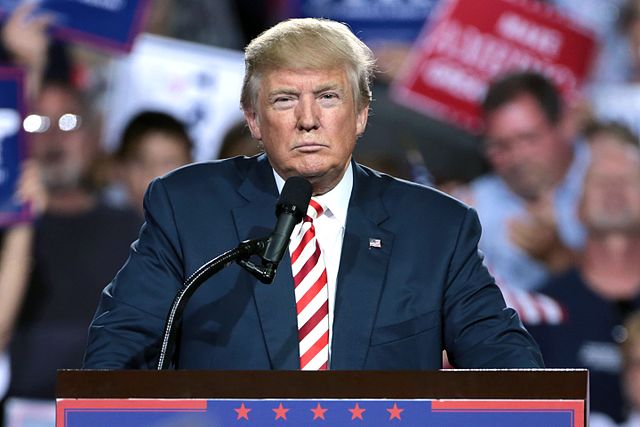
Trump ‘revelation’ on Kashmir mediation a test balloon?

In December 2001, soon after the attack on Parliament in New Delhi, the militaries of India and Pakistan were on an eyeball-to-eyeball confrontation across the border. A wrong move by either could have resulted in a major war. Intervention by the then-United States President George W Bush doused the fire and the troops were pulled back.
This was not the only time that the US had similarly intervened. Clearly, the US has played an active role in India-Pakistan relationship. By extension, the relationship is defined by Kashmir, as this disputed region is at the heart of the unending bitterness, rivalry and enmity between the two neighbouring nations.
So, when a couple of days back, the US President Donald Trump claimed that Indian Prime Minister Narendra Modi asked him to mediate on Kashmir, it wasn’t all that outlandish as is being made out to be. While only the two leaders know what exactly they told each other, it seems entirely plausible that there was a discussion on Kashmir and the role of the US in the region.
Unfortunately, for Trump, by publicly saying that Modi asked him to mediate on Kashmir, he had poked his fingers into an issue that India has always held dear — that it always rejects third-party mediation in resolving the Kashmir dispute.
In reality, however, the US, though apparently not trying to mediate the dispute, has been involved in issues arising out of the Kashmir tangle. During the Cold War, India, being closer to the Soviet Union, maintained an arm’s length distance from the United States. However, with the Soviet disintegration, India and the US have moved closer to a point where Washington seems closer to New Delhi than its traditional ally Islamabad.
Also read: Trump gets it Left, Right and Centre over Kashmir comment
It, therefore, seems logical for the US to contemplate a more active role in the Kashmir dispute than earlier. From an international and specifically the US point of view, Kashmir is a tinderbox that can go off at any moment. And considering both Indian and Pakistan are nuclear-capable, the results of a war can be disastrous for the region, and the world.
If in 1999, at the height of the Kargil conflict, US President Bill Clinton intervened, in 2001 after the attack on Parliament, it was his successor George W Bush who prevented a conflagration between an enraged India and Pakistan. Again in May 2002, following an attack in Kashmir, Bush entered the scene and persuaded the two countries to step back from a fight.
This was followed by the Mumbai terror attack on November 26, 2008, when India unsurprisingly got ready to take on Pakistan. Again it was President Bush who got into the peace-keeper act and prevented a war with Pakistan.
And in the latest attack in Pulwama in February this year, which predictably resulted in intense bad blood between the two neighbours, Donald Trump pressured Pakistan Prime Minister Imran Khan not to ratchet up the tension and managed to neutralise a war-like situation, especially after India’s Balakot air strike.
Also read: On Kashmir, Trump is talking like Hogwarts’ hat—only to himself
What these instances indicate is that not only are India and Pakistan unable to resolve the Kashmir dispute by themselves, they are also incapable of controlling the consequences of the incessant conflict in the Valley without affecting their mutual relationship. The spillovers of Kashmir have been worse, like the attack on Parliament and the terror attack in Mumbai. Unfortunately, neither country has had a leadership which could rise above the dispute and reach some sort of agreement on Kashmir that would mean peace in the region and between the two countries.
For the US, whose clout with New Delhi has grown in recent times, it is in its interests that India and Pakistan maintain peace, as both are its friends. Pakistan has consistently wanted third party mediation on Kashmir and needless to say, has several times asked the US to do the needful. The US has not openly attempted to enter the picture in the face of Indian resistance.
The entire episode earlier this week involving Modi and Trump, and the issue of US mediation in Kashmir announced in public could well be an attempt to gauge public mood in India as to whether there is still a strong opposition to the idea. In the context of Indo-US ties, which have never been as close as it is today, it is not far-fetched to expect Kashmir to be a topic of mutual discussion.
Also read: President does not make up things, says Trump’s advisor on Kashmir remark
Trump too, unlike his predecessors, has a history of behaving in a manner most unconventional by international diplomatic standards. For instance, his recent walk into North Korea across the border from South Korea just to shake hands with North Korean dictator Kim Jong-un was entirely his own initiative which caused some flutter within the US establishment. Trump’s move served to resume the nuclear disarmament talks which had gone into a limbo after the failure of the previous round in Hanoi.
From this point of view, it is not entirely inconceivable that there may have been some sort of a tete-a-tete between Trump and Modi where Kashmir could have made an appearance. And, Trump, being who he is, blurted out something he should probably have not. After all, who can deny the saying “there is no smoke without fire”.


